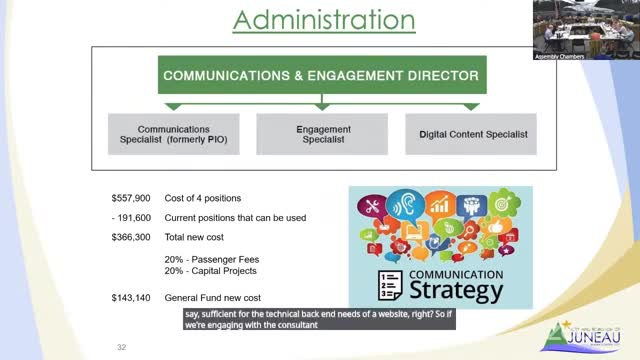Docks and Harbors, passenger‑fee plan reviewed; Assembly asked to weigh new $7 per‑passenger fee
Get AI-powered insights, summaries, and transcripts
Subscribe
Summary
Docks and Harbors presented the draft marine passenger fee budget and capital priorities, including shore‑power, seawall inspection and passenger amenities; city staff told the committee they plan to implement a change to a $7 per‑passenger cruise fee phased into FY27, which could yield about $3.2 million annually when fully in effect.
Docks and Harbors and the manager’s office presented a draft FY26 marine passenger fee budget and related marine capital projects to the Assembly Finance Committee on April 5. The presentation outlined several passenger‑industry capital priorities and noted the committee’s obligation under ordinance to post the passenger‑fee budget for public review after committee review.
Major elements in the draft passenger‑fee program include funding for shore‑power planning and seawall inspection, a Marine Park project advancing to design, security cameras along the downtown seawall following repeated vandalism incidents, funding for infrastructure to support cruise‑visitor wastewater and water needs and a covered bus stop at the heavily used Mendenhall Loop Road stop.
Docks and Harbors also noted operational costs for the new public Wi‑Fi system installed last year: the committee heard the project carries significant ongoing maintenance costs and will require annual funding; staff presented the FY26 maintenance estimate of about $771,500. Docks leaders said they expect to return with more detail on sustainment costs.
Passenger fees and cruise‑ship revenue model: committee members heard that staff and industry have discussed moving the downtown docks fee structure from a displacement/linear‑foot model to a per‑passenger fee, proposed at $7 per passenger. Finance staff told the committee that if the $7 per‑passenger fee is implemented and applied from calendar year 2026, the change could ultimately yield roughly $3.2 million in additional annual revenue once fully in effect. The Assembly has not yet adopted the new fee; staff said revenues were modeled into the FY27 view and that the exact treatment and distribution of any new proceeds would be an Assembly policy choice.
Why it matters: passenger fee revenues fund visitor‑industry infrastructure and programs the Assembly has directed to mitigate tourism impacts. Committee members asked for more detail on ongoing maintenance commitments (for public Wi‑Fi and security camera systems), how revenues would be allocated between docks, marine parks and other projects, and how passenger fee timing interacts with cruise scheduling and ticket purchases.
Ending: the passenger‑fee budget will be posted for public review under the required ordinance process; staff said they will return with a more detailed budget and recommended distribution of proceeds before any final Assembly action.
